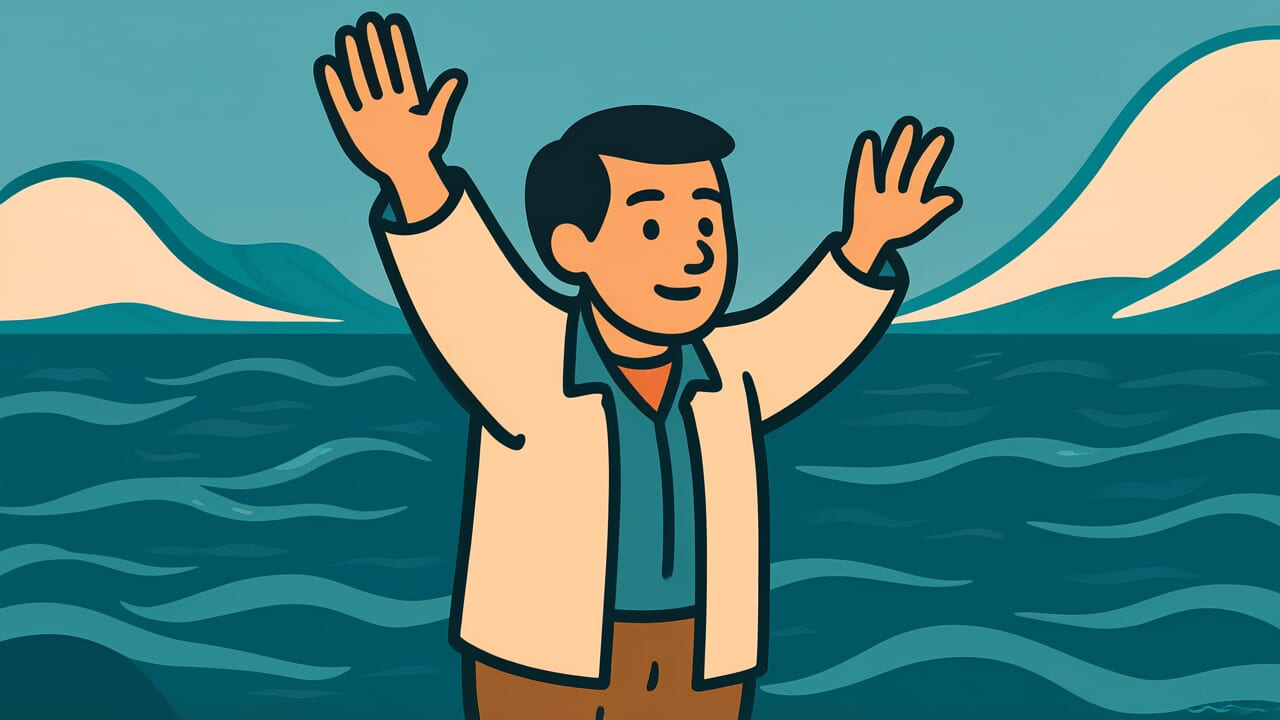How to Read “Aiming at distant things”
Okina mono ate
Meaning of “Aiming at distant things”
“Aiming at distant things” comes from the idea that objects far offshore are hard to judge accurately. It teaches that distant matters are easy to misjudge, so we should pay attention to what’s close at hand.
This proverb applies when people focus too much on distant futures or unreachable goals while overlooking important things right in front of them.
Distant things often look better than they really are, or sometimes worse. Distance makes accurate judgment impossible. The proverb warns us to work steadily on what we can grasp clearly.
This teaching still applies today. When you envy others’ glamorous lives on social media, or talk only about distant dreams while neglecting today’s efforts, you’re doing “Aiming at distant things.”
What you can surely reach, the tasks and relationships right before you—these are the areas you can understand most accurately and improve most reliably.
Origin and Etymology
No clear written records explain this proverb’s origin. However, the word structure offers interesting insights.
“Oki” means the ocean far from shore. “Ate” means making estimates or guesses. So “Aiming at distant things” literally describes guessing about objects far offshore.
This expression likely emerged from Japan’s geography as an island nation surrounded by sea. For people in fishing and maritime trade, accurately reading offshore conditions was a life-or-death skill.
But no matter how hard you looked, you couldn’t see offshore conditions accurately. Wave height, fish schools—you couldn’t know the truth until you got close.
From such ocean experiences came the lesson that “distant things are easy to misjudge.” This wisdom expanded beyond physical distance to become a warning about judgment in life generally.
Don’t neglect what’s before you while your heart chases uncertain distant things. This simple yet profound wisdom, born from life by the sea, has been passed down through generations.
Usage Examples
- Big dreams matter, but let’s do today’s work carefully to avoid “Aiming at distant things”
- That company looks good, but it might be “Aiming at distant things”—first think about what you can do at your current workplace
Universal Wisdom
“Aiming at distant things” contains universal wisdom about the limits of human perception and the importance of recognizing those limits.
Human eyes cannot accurately capture distant objects, physically or psychologically. The farther away something is, the more we fill gaps with imagination and project our hopes and fears.
The grass looks greener on the other side, distant mountains look beautiful—actually because our desires are reflected there.
This human trait doesn’t change with time. Just as ancient people misjudged offshore conditions, modern people tend to hold excessive expectations or anxieties about unreachable things.
The more distant something is, the more we interpret it to suit ourselves.
Our ancestors left this proverb because they deeply understood this human tendency. They also knew that true richness and happiness exist in the nearby realm we can grasp reliably.
Look at your feet before looking far away. This teaching warns against fundamental human illusions while explaining the value of cherishing the reality that exists here and now.
When AI Hears This
“Aiming at distant things”—when wild guesses sometimes hit—shows a typical scene where human brains misunderstand probability. Consider a lottery with 1% odds. After 99 losses, many people feel “it should hit soon.” But this is complete illusion.
On the 100th try, the odds remain 1%. Past results don’t influence future outcomes at all.
Interestingly, the reverse pattern exists too. When someone wins three times straight, people say “that person is lucky.” But if 10,000 people try three times each, probability dictates about 10 will win three straight.
In other words, people who succeed at “Aiming at distant things” must exist in certain numbers by design. Just like lottery jackpot winners appear every year.
Even more interesting: humans strongly remember only winning moments. Even with 100 losses and 1 win, people remember that one win as an “amazing coincidence.” The 99 losses are forgotten.
That’s why fortune-telling and hunches seem to “often hit.” Actually, calculating expected value shows huge losses, but brains store only the excitement of winning moments.
This cognitive gap is the root cause of gambling addiction and unscientific judgment. Human brains are structured to resist accepting the cold fact that probability has no memory.
Lessons for Today
This proverb teaches modern people the wisdom of “cherishing what you can surely reach.”
We’re surrounded daily by massive information. News from around the world, others’ success stories, distant future possibilities. While your heart is captured by such “offshore” information, aren’t you missing changes in your family right before you?
Aren’t you overlooking small improvements you could make today?
The point isn’t to stop looking far ahead. Just recognize that distant things are more uncertain and easily mixed with your assumptions.
Remember that the nearby realm you can grasp and influence reliably holds the power to change your life.
Conversations with people you meet today, work you’re tackling now, the place where you live. These aren’t “offshore”—they’re the “shore” where you stand firmly.
Each step here will eventually carry you far. Strengthening your footing is actually the most reliable path to the future.



Comments